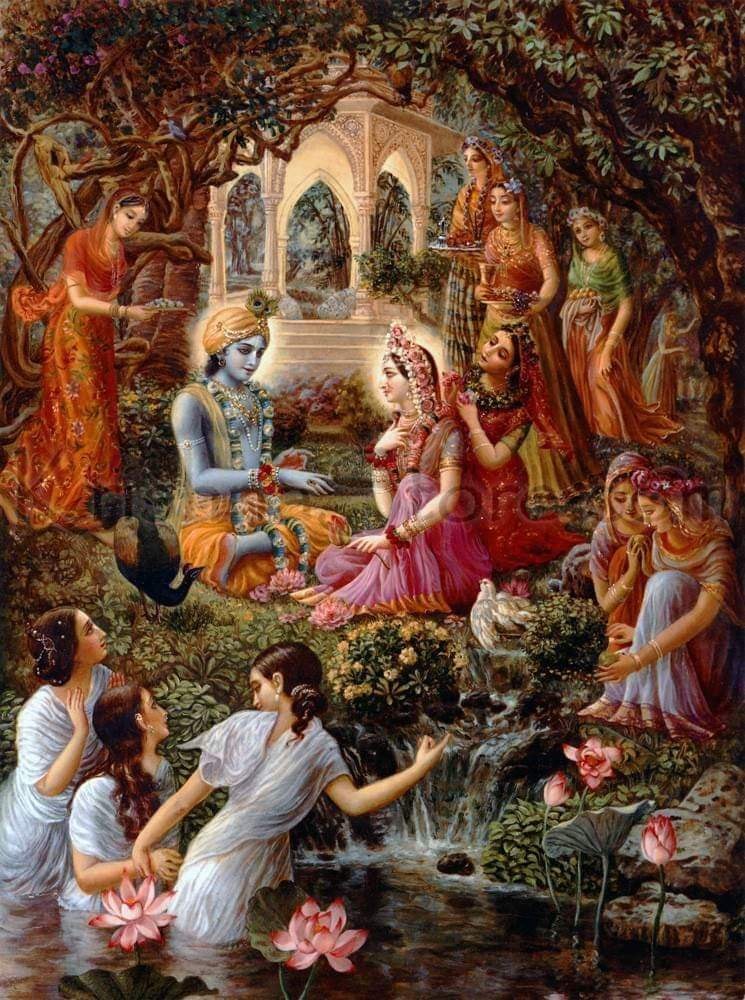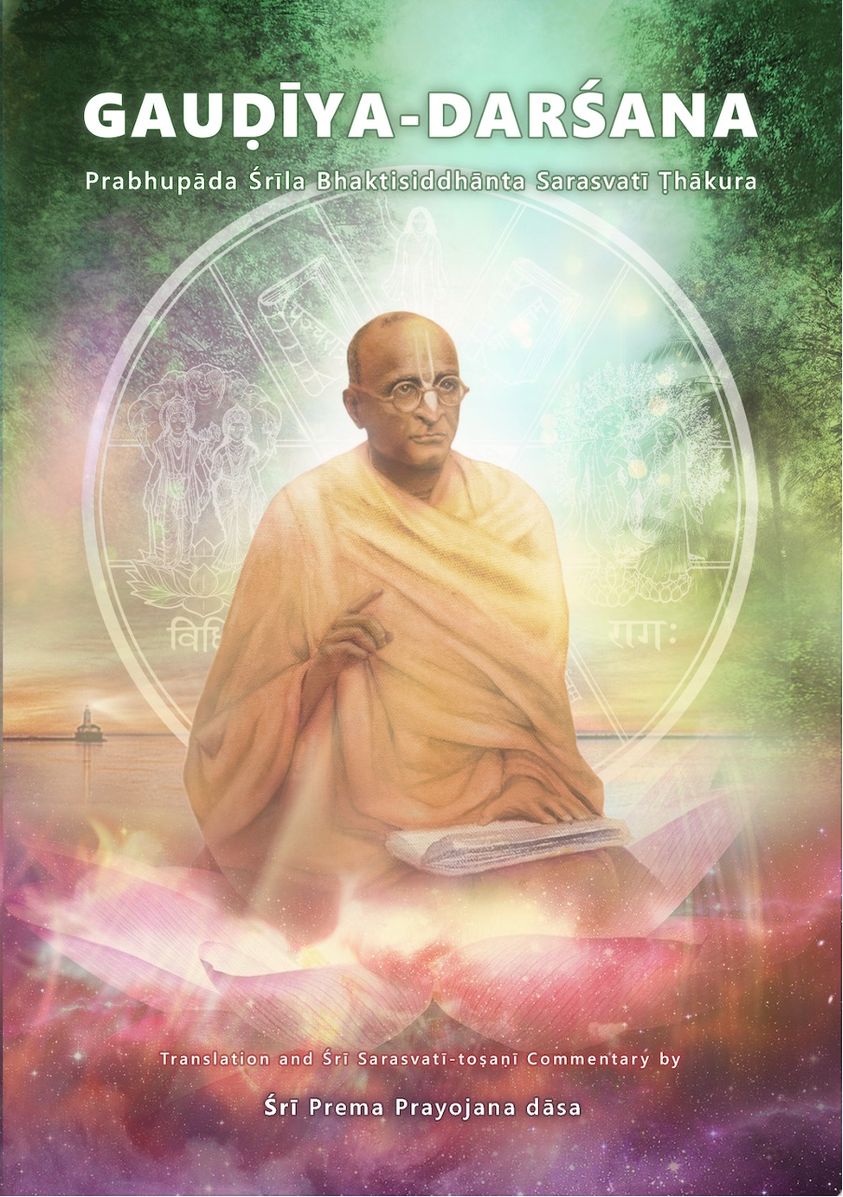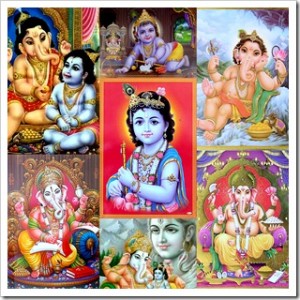
Kālī, Durgā, Śiva, Ganeśa, non are God. Krishna is in the centre
“Lord Krishna has made a firm promise for all time. If one renders service unto Him, Krishna correspondingly gives him an equal amount of success in
devotional service to the Lord.
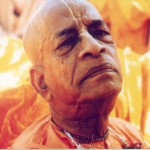
Written by Srila Bhaktivedanta Swami Prabhupada
It is a completely mistaken idea that one can worship Krishna in any form or in any way and still attain the ultimate result of receiving the favour of the Lord. This is a decision made by gross materialists. Generally such men say that you can manufacture your own way of worshiping the Supreme Lord and that any type of worship is sufficient to approach the Supreme Personality of Godhead. Certainly there are different means for attaining different results in fruitive activity, speculative knowledge, mystic yoga and austerity. Crude men therefore say that one who adopts any of these methods achieves the Supreme Personality of Godhead’s favour. They claim that it doesn’t matter what kind of method one adopts. A general example is given: If one wishes to arrive at a certain place, there are many roads leading there, and one can go to that place by any one of these roads. Similarly, these gross materialists say, there are different ways to attain the favour of the Supreme Personality of Godhead. They claim that one can conceive of the Supreme Personality of Godhead as goddess Durga, goddess Kali, Lord Siva, demigod Ganesa, Lord Ramacandra, Krishna, the impersonal Brahman or whatever, and one can chant the Lord’s name in any way and in any form. Such materialists claim that since ultimately all these names and forms are one, the result is the same. They also give the example that a man who has different names will answer if called by any one of them. Therefore, they claim, there is no need to chant the Hare Krishna mantra. If one chants the name of Kali, Durga, Siva, Ganesa or anyone else, the result will be the same.
Such claims made by mental speculators are no doubt very pleasing to mental speculators, but those who are actually in knowledge do not admit such conclusions, which are against the authority of the sastras. A bona fide acarya will certainly not accept such a conclusion. As Krishna clearly states in the Bhagavad-gita (9.25):
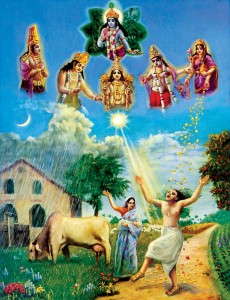
Demigods are depending on Krishna for giving blessings
bhutani yanti bhutejya yanti mad-yajino ’pi mam
“Those who worship the demigods will take birth among the demigods, those who worship the ancestors go to the ancestors, those who worship ghosts and spirits will take birth among such beings, and those who worship Me will live with Me.”
Only the devotees of the Lord can be admitted to His kingdom—not the demigod worshipers, karmis, yogis or anyone else. A person who desires elevation to the heavenly planets worships various demigods, and material nature may be pleased to offer such devotees their desired positions. The material nature gives a person his own nature, by which he increases affection for different types of demigods. However, the Bhagavad-gita (7.20) says that demigod worship is meant for men who have lost all their intelligence:
kamais tais tair hrita-jnanah prapadyante ’nya-devatah
tam tam niyamam asthaya prakritya niyatah svaya
“Those whose intelligence has been stolen by material desires surrender unto demigods and particular rules and regulations of worship according to their own natures.”
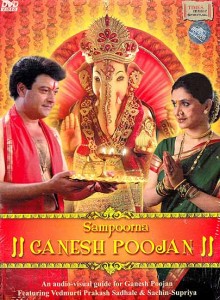
Demigod worship
Although one may be elevated to the heavenly planets, the results of such a benediction are limited:
anta-vat tu phalam tesham tad bhavaty alpa-medhasam
devan deva-yajo yanti mad-bhakta yanti mam api
“Men of small intelligence worship the demigods, and their fruits are limited and temporary. Those who worship the demigods go to the planets of the demigods, but My devotees ultimately reach My supreme planet.” (Bg. 7.23)
Being elevated to the heavenly planets or other material planets does not mean attaining an eternal life of knowledge and bliss. At the end of the material world, all attainments of material elevation will also end. Again, according to Krishna in the Bhagavad-gita (18.55), only those who engage in His loving devotional service will be admitted to the spiritual world and return to Godhead, not others:
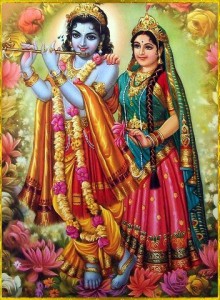
Radha And Krishna
bhaktya mam abhijanati yavan yas casmi tattvatah
tato mam tattvato jnatva visate tad-anantaram
“One can understand Me as I am, as the Supreme Personality of Godhead, only by devotional service. And when one is in full consciousness of Me by such devotion, he can enter into the kingdom of God.”
Impersonalists cannot understand the Supreme Personality of Godhead; therefore it is not possible for them to enter into the spiritual kingdom of God and return home, back to Godhead. Actually one attains different results by different means. It is not that all achievements are one and the same. Those interested in the four principles of dharma, artha, kama and moksha cannot be compared to those interested in the unalloyed devotional service of the Lord. Srimad-Bhagavatam (1.1.2) therefore says:
dharmah projjhita-kaitavo ’tra paramo nirmatsaranam satam
vedyam vastavam atra vastu siva-dam tapa-trayonmulanam
srimad-bhagavate maha-muni-krite kim va parair isvarah
sadyo hridy avarudhyate ’tra kritibhih susrushubhis tat-kshanat
“Completely rejecting all religious activities which are materially motivated, this Bhagavata Purana propounds the highest truth, which is understandable by those devotees who are pure in heart. The highest truth is reality distinguished from illusion for the welfare of all. Such truth uproots the threefold miseries. This beautiful Bhagavatam, compiled by the great sage Sri Vyasadeva, is sufficient in itself for God realization. As soon as one attentively and submissively hears the message of Bhagavatam, he becomes attached to the Supreme Lord.”
Those who aspire after liberation attempt to merge into the impersonal Brahman. To this end they execute ritualistic religious ceremonies, but Srimad-Bhagavatam considers this a cheating process. Indeed, such people can never dream of returning home, back to Godhead. There is a gulf of difference between the goal of dharma, artha, kama and moksha and the goal of devotional service.
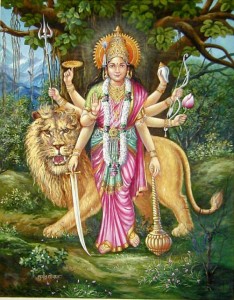
The Goddess Durga
The goddess Durga is the superintending deity of this material world, which is made of material elements. The demigods are simply different directors engaged in operating the departments of material activities, and they are under the influence of the same material energy. Krishna’s internal potencies, however, have nothing to do with the creation of this cosmic material world. The spiritual world and all spiritual activities are under the direction of the internal, spiritual energy, and such activities are performed by Yogamaya, the spiritual energy. Yogamaya is the spiritual or internal energy of the Supreme Personality of Godhead. Those who are interested in being promoted to the spiritual world and engaging in the service of the Lord attain spiritual perfection under the control of Yogamaya. Those who are interested in material promotion engage in ritualistic religious ceremonies and economic development to develop sense gratification. They ultimately attempt to merge into the impersonal existence of the Lord. Such people generally become impersonalists. They are interested in worshiping Lord Siva or goddess Durga, but their return is one hundred percent materialistic.
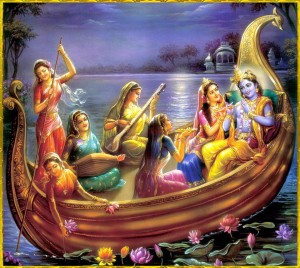
Others speculate, but Krishnas devotees know He is a beautiful person performing wonderful pastimes in His own abode Goloka Vrindavan.
Following the example of the gopis, the devotees sometimes worship the goddess Katyayani, but they understand that Katyayani is an incarnation of Yogamaya. The gopis worshiped Katyayani, Yogamaya, to attain Krishna as their husband. On the other hand, it is stated in the Sapta-sati scripture that a kshatriya king named Suratha and a rich vaisya named Samadhi worshiped material nature in the form of goddess Durga to attain material perfection. If one tries to mingle the worship of Yogamaya with that of Mahamaya, considering them one and the same, he does not really show very high intelligence. The idea that everything is one is a kind of foolishness indulged in by those with less brain substance. Fools and rascals say that the worship of Yogamaya and the worship of Mahamaya are the same. This conclusion is simply the result of mental speculation, and it has no practical effect. In the material world, sometimes one gives an exalted title to an utterly worthless thing; in Bengal this is known as giving a blind child a name like Padmalocana, which means “lotus-eyed.” One may foolishly call a blind child Padmalocana, but such an appellation does not bear any meaning.
In the spiritual world the Absolute Lord is always identical with His name, fame, form, qualities and pastimes. Such identity is impossible in the material world, where the name of a person is different from the person himself. The Supreme Lord has many holy names like Paramatma, Brahman and “the creator,” but one who worships the Lord as the creator cannot understand the relationship between a devotee and the Lord in the five types of transcendental mellows, nor can he understand the conception of Krishna. One cannot understand the six transcendental opulences of the Lord simply by understanding the Supreme Personality of Godhead as impersonal Brahman.
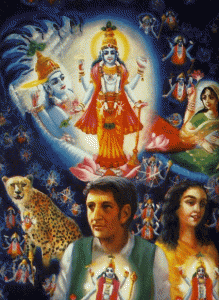
God Paramatma inside my heart
Impersonal realization of the Absolute Truth is certainly transcendental, but this does not mean that one who has attained this realization can understand the sac-cid-ananda form of the Lord. Similarly, Paramatma realization—realization of the plenary expansion of the Absolute Truth within everyone’s heart—is also an incomplete understanding of the Absolute Truth. Even a devotee of the Personality of Godhead Narayana cannot actually understand the transcendental attractive features of Krishna. Indeed, a devotee of Krishna who is attached to the sublime attractive features of the Lord does not consider Narayana very important. When the gopis sometimes saw Krishna in the form of Narayana, they were not very much attracted to Him. The gopis never addressed Krishna as Rukmini-ramana. Krishna’s devotees in Vrindavana address Him as Radharamana, Nandanandana and Yasodanandana, but not as Vasudeva-nandana or Devaki-nandana. Although according to the material conception Narayana, Rukmini-ramana and Krishna are one and the same, in the spiritual world one cannot use the name Rukmini-ramana or Narayana in place of the name Krishna. If one does so out of a poor fund of knowledge, his mellow with the Lord becomes spiritually faulty and is called rasabhasa, an overlapping of transcendental mellows. The advanced devotee who has actually realized the transcendental features of the Lord will not commit the mistake of creating a rasabhasa situation by using one name for another. Because of the influence of Kali-yuga, there is much rasabhasa in the name of extravagance and liberal-mindedness. Such fanaticism is not very much appreciated by pure devotees.
Madhya 8.91

 Posted in
Posted in 






